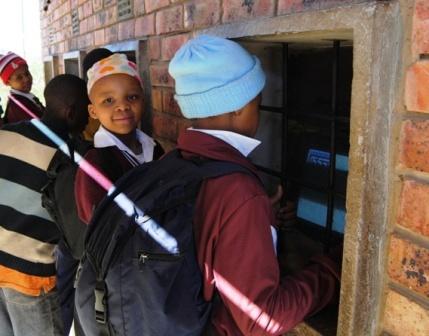
The Early Childhood Development (ECD) sector in South Africa is developing, for the first time, a critically important framework for people working with young children (birth to four years).
According to Ms Margaret Irvine, who has worked extensively in the ECD sector in South Africa and Africa more broadly, South Arica urgently needs to develop an integrated approach to the ECD sector accompanied by an overhaul of the current perceptions of young children.
Ms Irvine was speaking at Rhodes University recently as part of the Centre for Social Development’s (CSD) weeklong observance of Unicef’s Global Action Week for Education which focused on ECD.
“We need to understand that babies are born as competent human beings whose learning and development is important, and who need strong connections with adults. Our attitudes towards children and childhood need to change so that our behaviours towards them and our own actions change. We are not yet conscious, deliberate and purposeful about ECD and this is hindering us,” she said. These changes are crucial in order to provide a feasible solution to the flailing education system in the country, Ms Irvine said.
According to recent statistics, of the one million children that start Grade 1 each year, less than a quarter make it to Grade 12, of which an eighth achieve a Grade 12 pass. Of this, seven percent make it to the higher education sector.
Rhodes University Deputy Vice-Chancellor Dr Sizwe Mabizela, said the tragedy of the South African national discourse on education is that it focuses on the back end of the problem.
“We need to invest in the front end of the process and pay particular attention to foundation phase education to ensure that learners have adequate foundations on which to develop,” Dr Mabizela said. “In the end the success of our democratic society shouldn’t be based on the state of the economy or business but on how well we ensure that every citizen is able to reach their potential. Holistic learning that unleashes every citizen’s potential is the most important investment we can make.”
Ms Irvine is currently working on developing a curriculum for ECD which is envisaged to be rolled out across the country. According to Ms Irvine, an organised approach to ECD would consider the National Early Learning Development Standards (NELDS), constitution, policies for children and ideas from abroad.
She has incorporated these aspects into her Proposal for the National Curriculum Framework for Children from Birth to Four, co-authored with Professor Hasina Ebrahim of the School of Education at the University of Free State. The document is envisaged to assist government with its mandate and retains a vision of “working together with children as partners and human beings,” Ms Irvine said.
The framework focuses upon working with young children in a respectful way to provide them with quality experiences and equality of opportunities to achieve their full potential. Six early learning areas are envisaged, including wellbeing, identity and belonging, communication, exploration of mathematics, creativity and knowledge and understandings of the world.
The notion of wellbeing embraces the enjoyment of constitutional rights, good nutrition, good health, safety and security, the development of physical abilities and interests and resilience, and underpins all of the early learning areas.
In addition, an African approach to the notion of childhood and parenthood informs the framework. An example of this is that while children learn through play, which is a particularly Western European notion, children also learn through observing the behaviours of the adults around them, which is a particularly African approach to child-rearing.
Local and indigenous knowledge, skills and beliefs are resources that need to be utilised to promote socially, culturally and linguistically sensitive learning environments for all children living in South Africa, Ms Irvine said. In the same way, family members are the primary educators of their children and must be included in the ECD and schooling programmes.
For more information visit www.ru.ac.za/csd/earlychildhooddevelopment
By Sarah-Jane Bradfield
Picture Supplied
